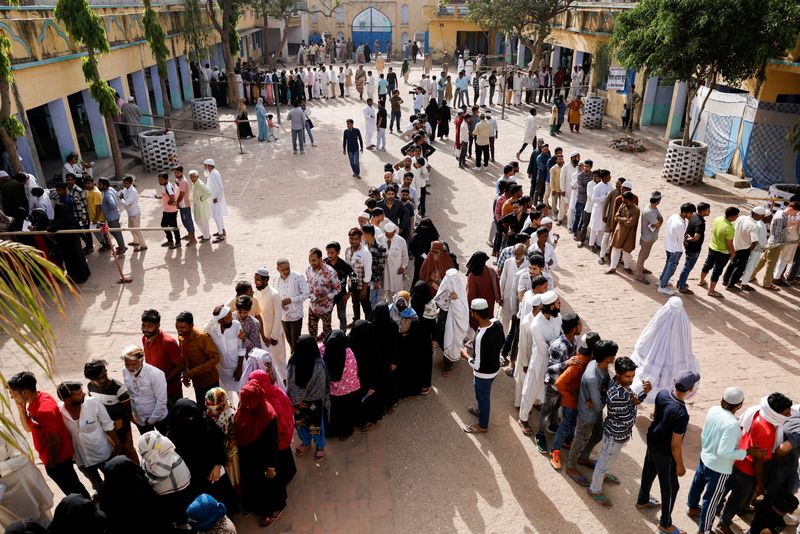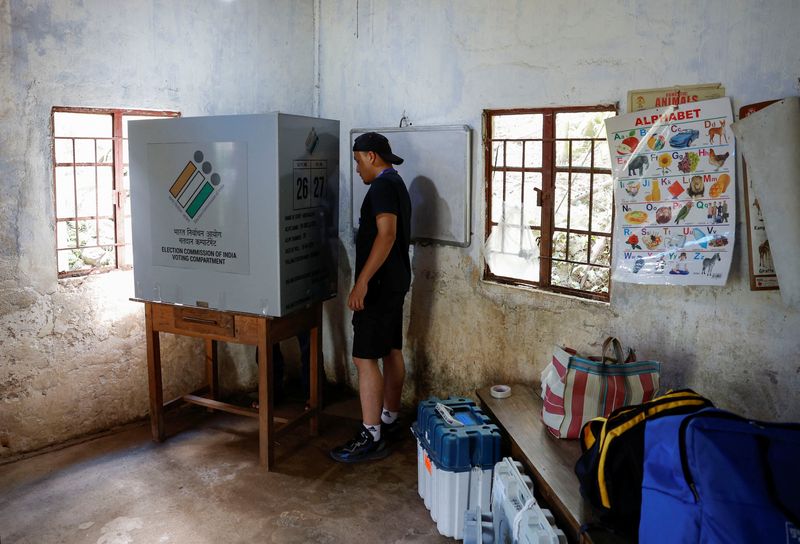By Krishn Kaushik, Praveen Paramasivam and YP Rajesh
KAIRANA/CHENNAI, India (Reuters) -The first of India's almost one billion voters cast ballots on Friday in the country's multi-day election, as Prime Minister Narendra Modi seeks a rare third term on the back of issues such as growth, welfare and Hindu nationalism.
The vote pits Modi's Bharatiya Janata Party (BJP) against an alliance of two dozen opposition parties that promise greater affirmative action and more handouts while stressing what they call the need to save democratic institutions.
Nearly 970 million people are eligible to vote in the seven-phase exercise, the world's largest election, which runs through the peak of summer until June 1, with results set for June 4.
Election Commission figures after polls closed on Friday's first day of voting estimated voter turnout at 60%, with the small northeastern state of Tripura top of the list at 80% and the northwestern state of Rajasthan at the bottom with 51%.
"Polling for the first phase...recorded high voter turnout despite the heat wave," the panel said. "The voting percentage is likely to go upwards when reports from all polling stations are obtained."
Friday's vote covered 166 million voters in 102 constituencies across 21 states and territories, from Tamil Nadu in the south to Arunachal Pradesh on the Himalayan frontier with China.
Opinion polls have suggested the BJP will easily win a majority, even though voters worry about unemployment, inflation and rural distress in the world's most populous country and fastest growing major economy.
"Modi will come back to power, because apart from the religious push, his other work, in areas such as safety and security, is good," said Abdul Sattar, 32, a Muslim voter in the city of Kairana in the most populous state of Uttar Pradesh.
Jobs were the chief concern for Mohammed Shabbir, another Muslim voter in Kairana. None of his eight children had regular employment, the 60-year-old driver said.
"Even the Hindus are affected by a lack of jobs," he said, adding that the problem outweighed the appeal of Hindu nationalism in the Hindu-majority nation.
Hindu nationalism is a key election theme, especially after Modi's consecration of a grand temple to Lord Ram in January on a site in Uttar Pradesh believed to be his birthplace, more than three decades after a Hindu mob destroyed a 16th-century mosque that had stood there, leading to nationwide religious riots.
In 2019, the Supreme Court handed over the land to Hindus and ordered allotment of a separate plot to Muslims to build a new mosque.
Critics accuse Modi's government and party of treating India's 200 million minority Muslims unfairly to please their hardline Hindu base - an accusation that both deny.
Modi aims to win 370 of parliament's 543 seats, up from 303 in 2019, hoping for a two-thirds majority that some analysts and opposition members fear could let his party usher in far-reaching constitutional changes.
STRONG SOUTHERN PUSH
But in Tamil Nadu, one of India's most developed states where the BJP is weak, voters seemed divided on whether Modi's strong push this time round would benefit his party.
"Modi has made India a peaceful country, particularly for Hindus," said S. Rajagopal, a three-wheel taxi driver in the state capital of Chennai.
"The BJP may not boost its vote share in Tamil Nadu but nationwide, Modi will win hands down again."
However, V. Parasuraman, 55, a businessman in construction, said the BJP had done little for Tamil Nadu, adding, "People here are educated and ... won't fall for Modi's sugar-coated words."
The BJP campaign focuses on Modi’s guarantee to deliver on promises to voters.
"The country has made up its mind," Modi said at a campaign rally on Friday.
"After today's first round of voting, there is one thing visible...the country wants a strong, stable government", and voting for the opposition alliance "is as good as wasting your vote", he said.
Campaigning continues during the election process for seats that are scheduled to vote in later phases.
Victory for Modi would make him only the second Indian prime minister to be elected three times in a row, after post-independence leader Jawaharlal Nehru.
WEAK, FRAGMENTED OPPOSITION
Surveys show a big gap between the BJP and the opposition but political analyst Sandeep Shastri of research firm Lokniti Network (LON:NETW) said it was not "necessarily unsurmountable".
"Many voters say that we take our decision on who to vote for during campaigning and many say we do it closer to the day of voting," he said. "So there is also scope for campaigning to impact the nature of the verdict."
But some BJP insiders and analysts say the party is worried about complacency or overconfidence among voters and party members, and needs to draw more people to vote.
Yet the opposition's INDIA alliance has struggled to forge unity. It has accused the government of hobbling its efforts by arresting its leaders in graft cases and making huge tax demands ahead of the vote - a charge the government denies.

Rahul Gandhi, leader of the main opposition Congress party, said on X the election would decide the future of Indian democracy.
"Strengthen democracy by applying the balm of your vote to the wounds inflicted on the soul of the nation in the last 10 years ... defeat hatred," he said on Friday.
